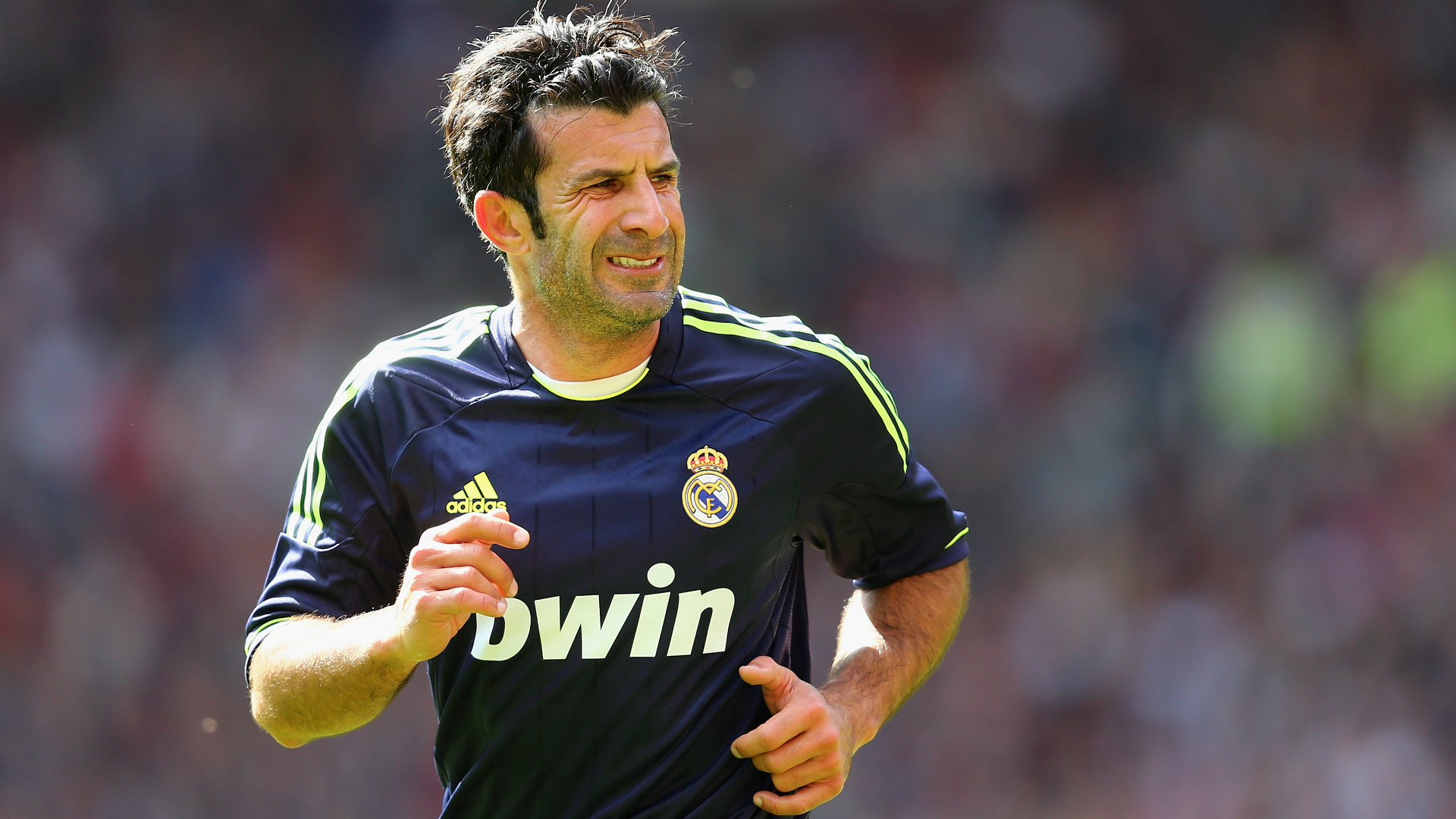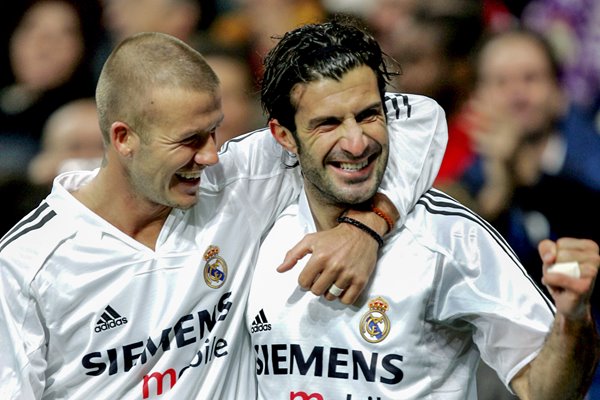Luís Figo
Luís Figo

Luís Filipe Madeira Caeiro Figo, born on 4 November 1972, is a retired Portuguese professional footballer renowned for his role as a winger. Figo had an illustrious career, playing for notable clubs such as Sporting CP, Barcelona, Real Madrid, and Inter Milan. With 127 caps, he held the record for the most appearances for the Portugal national team at one point and is widely regarded as one of the greatest players of his generation.
Figo's impact in La Liga is evident in his 106 assists, the second-highest in the league's history, trailing only behind Lionel Messi. In recognition of his outstanding performances, he received prestigious awards, including the 2000 Ballon d'Or and the 2001 FIFA World Player of the Year. In 2004, Pelé included Figo in the FIFA 100 list, acknowledging him as one of the world's greatest living players.
Notably, Figo made a controversial transfer in 2000 from Barcelona to Real Madrid, setting a world record fee of €62 million. This move marked a rare instance of a player transitioning between Spanish rival clubs. Figo's conditional agreement with Florentino Perez, who was vying for the presidency of Real Madrid, stipulated that if Perez won, Figo would join Real Madrid. The agreement also imposed a penalty fee of 5 billion pesetas on Figo if he declined to leave Barcelona. However, if Perez lost the election, Figo would retain 400 million pesetas.
Figo's illustrious career featured numerous trophy triumphs, including domestic and international titles. He secured victories in the Portuguese Cup, La Liga , Spanish Cup , Spanish Super Cup (thrice), UEFA Champions League, UEFA Cup Winners' Cup, UEFA Super Cup , Intercontinental Cup, Serie A , Italian Cup, and Italian Super Cup . At the international level, Figo scored 32 goals for Portugal and represented his nation in three European Championships and two World Cups. His contributions led Portugal to the Euro 2004 final, where they finished as runners-up, and the 2006 World Cup semi-finals.
Sporting CP
Luís Figo began his football career at Sporting CP, and he made his league debut on 1 April 1990 during the 1989–90 season, coming on as a substitute for Marlon Brandão in a 1–0 home victory against Marítimo. Figo scored his first goal for Sporting CP on 7 December 1991, during the 1991–92 season, in a match against Torreense, where he equalized in a 2–1 victory for Sporting.During his time at Sporting CP, Figo achieved success at the youth level, winning the 1991 FIFA Under-20 World Championships and the Under-16 European Championships. He played alongside fellow Portuguese talents such as Rui Costa and João Pinto. Figo was a key part of Portugal's "Golden Generation."In his final season with Sporting CP, Figo secured the 1994–95 Portuguese Cup, marking a successful conclusion to his time with the club.
Barcelona
In 1995, Luís Figo seemed destined to join one of Europe's top clubs, but a contractual dispute involving Italian clubs Juventus and Parma led to a two-year transfer ban on Figo in Italy. Eventually, he made a move to the Spanish powerhouse Barcelona for a fee of £2.25 million. However, due to a rule preventing Portuguese players from signing for foreign clubs outside a fixed period, Figo was loaned back to Sporting CP for the remainder of the season.
This rule also prevented Figo from joining English club Manchester City, where he had been recommended by his former Sporting manager Malcolm Allison for a fee of around £1.2 million.
Figo's career truly blossomed at Barcelona, where he won the 1996–97 UEFA Cup Winners' Cup, playing alongside Ronaldo. He went on to secure successive Primera División titles with Barcelona, forming a formidable attacking trio with Rivaldo and Patrick Kluivert. During his time with Barcelona, Figo made 172 league appearances, scoring 30 goals. His presence at the club was highly appreciated in Barcelona, as it brought a sense of external approval to Catalonia.
Euro 2000 and 2002 World Cup
Luís Figo played a crucial role in Portugal's qualification for the next European Championship, featuring in all ten qualifiers and scoring three goals. In their opening game of the Euro 2000 tournament in Eindhoven on 12 June 2000, Figo scored Portugal's first goal as they came from behind to beat England 3–2. Portugal advanced as group winners but were ultimately eliminated in the semi-finals.Figo was rested by coach Humberto Coelho for the final group match against Germany in Rotterdam, ending a chain of 32 consecutive international appearances. His only hat-trick for the national team occurred on 15 August 2001 in a friendly against Moldova, where he scored all three goals in a 3–0 victory at the Estádio de São Luís in Faro.With six goals in nine matches, Figo played a pivotal role in helping Portugal qualify for the 2002 FIFA World Cup. On 2 June 2001, during a qualifier against the Republic of Ireland at Lansdowne Road, he served as captain for the first time on his 74th cap and scored the equalizer in a 1–1 draw. Despite his contributions, Portugal suffered group stage elimination in the 2002 World Cup, and Figo did not score a goal in the tournament.
At his physical peak, Luís Figo was a quick, elegant, and highly skillful player known for his close control, acceleration, and dribbling ability, allowing him to frequently take on and beat defenders in one-on-one situations. Despite being naturally right-footed, he was capable of using either foot and often employed feints, including stepovers, to outmaneuver opponents. Initially deployed as a winger, Figo excelled in providing assists through curling crosses from the right flank, cutting inside, drifting onto the left, and linking up with midfielders to create goal-scoring opportunities. He holds the second-most assists in La Liga history behind Lionel Messi.
As his career progressed and he experienced a decline in pace and mobility, Figo transitioned to a playmaking role as an attacking midfielder, particularly during his time with Inter. In this position, he showcased his vision, intelligence, and diverse passing ability. Despite primarily serving as a creative player, Figo remained a goal-scoring threat due to his powerful strikes from distance and accuracy in free-kicks and penalties. Beyond his football skills, Figo was highly regarded for his leadership qualities throughout his career.
References
- "2006 FIFA World Cup Germany: List of Players: Portugal" (PDF). FIFA. 21 March 2014. p. 22. Archived from the original (PDF) on 10 June 2019.
- ^ "Figo Stats". FootballDatabase.com. Retrieved 23 December 2006.
- ^ "19 Intriguing Facts About Luis Figo". Facts.net. 7 October 2023. Retrieved 18 February 2024.
- ^ admin. "FIGO". Ultimate Football Heroes. Retrieved 18 February 2024.
- ^ "Figo". greatfootballers.weebly.com. Retrieved 18 February 2024.
- a b "Crisis? What crisis? Harmony restored as Barcelona close gap on Madrid". Goals.com. 9 February 2015.
- ^ "Pele's list of the greatest". BBC Sport. 4 March 2004. Retrieved 19 June 2014.
- ^ "The history of the world transfer record" Archived 2 January 2016 at the Wayback Machine. BBC News. Retrieved 1 May 2014
- ^ Fitzpatrick, Richard. "Luis Figo to Real Madrid: The Transfer That Launched the Galacticos Era (Refer to Chapter II - Paragraphs 8 and 9)". Bleacher Report. Retrieved 8 March 2024.
- ^ Fitzpatrick, Richard. "Luis Figo to Real Madrid: The Transfer That Launched the Galacticos Era (Refer to Chapter II - Paragraphs 8 and 9)". Bleacher Report. Retrieved 8 March 2024.
- ^ "expertfootball.com". AFP. 23 June 2012. Archived from the original on 17 February 2006. Retrieved 23 June 2012.
- ^ Futsalfeed.com (14 March 2020). "Top 10 Footballers Who Played Futsal!" "Archived 6 November 2020 at the Wayback Machine", "futsalfeed.com". Retrieved 14 March 2020.



















































